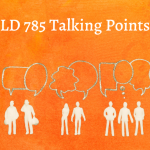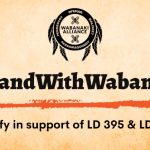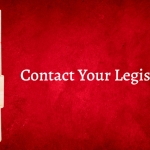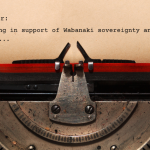The civil rights movement of the 1960s was born out of systemic disenfranchisement, just as the Wabanaki’s fight for recognition arises from a
legacy of lies, fraudulent treaties and broken promises. Dr. King’s leadership was marked by a commitment to nonviolent resistance, a strategy rooted in moral conviction and the belief in the inherent humanity of oppressors. Similarly, the Wabanaki’s approach often emphasizes dialogue, education, and lawful resistance. The Wabanaki people seek to uphold their rights through perseverance and by shining a light on the injustices they endure, from environmental devastation of ancestral lands to the continued struggle for tribal sovereignty. There are those who want the Wabanaki and their allies to wait and keep silent.
Dr. King described the indignities of segregation,
noting, “It is easy for those who have never felt the stinging darts of segregation to say, ‘Wait.’” For African Americans, “waiting” is rooted in the belief that the full realization of their humanity, including repair from surviving the genocidal period of enslavement, was coming. It has been a similar “wait” for the Wabanaki, and has meant watching as their rivers are polluted, their children are removed from their families, and their sovereignty is dismissed.
Dr. King’s movement drew its strength from the unity and resilience of ordinary people who refused to accept the status quo. He
said, “Human progress is neither automatic nor inevitable. … Every step toward the goal of justice requires sacrifice, suffering, and struggle.” The Wabanaki know this truth intimately. From elders who keep language and traditions alive, to youth who carry the torch of advocacy into the future, progress relies on the collective will of the Wabanaki people to confront injustice head-on.
Dr. King’s dream of equality and freedom was not just an aspiration but a call to action — one that was deeply rooted in economic equality and economic freedom. Similarly, the Wabanaki fight is a call to action animated by the quest for survival and the faith that the land can heal, that Wabanaki sovereignty will be respected, and that Wabanaki children will grow up proud of who they are.
The intersections of these two movements reveal the profound truth that justice is interconnected. As Dr. King
famously said, “Injustice anywhere is a threat to justice everywhere.” The oppression of one group diminishes the humanity of all, and the fight for civil rights — whether in the Deep South or sovereignty on the banks of the Penobscot River — is a fight for the soul of our nation.
These two populations uniquely hold the harm and the impact of systemic racism over the generations of living on this soil, in this place we call Maine.
We see our struggle reflected in the words and legacy of Dr. King. Both movements remind us of the enduring power of resilience, the necessity of solidarity, and the unwavering belief in a better future. Together, they challenge us to confront oppression wherever it exists and to work tirelessly toward a world where justice is not just a dream but a reality for all. For the Wabanaki, this journey is ultimately a vision where sovereignty is fully realized, and where the Wabanaki people can thrive as stewards of their lands, their culture, and their destiny.
We draw inspiration from the resilience of those who came before us and the allies who stand beside us today.







